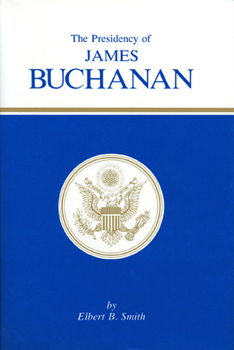The Presidency of James Buchanan
(Part of the American Presidency Series Series)
Select Format
Select Condition 
Book Overview
This book offers conclusions that are very different from most of the traditional historical interpretations of the Buchanan presidency. Historians have either condemned Buchanan for weakness and vacillation or portrayed him as a president dedicated to peace who did everything constitutionally possible to avoid war. Under the scrutiny of Elbert B. Smith, Buchanan emerges as a strong figure who made vital contributions not to peace but to the accelerating...
Format:Hardcover
Language:English
ISBN:0700601325
ISBN13:9780700601325
Release Date:May 1975
Publisher:University Press of Kansas
Length:244 Pages
Weight:1.40 lbs.
Dimensions:0.9" x 6.2" x 9.3"
Customer Reviews
3 ratings
The Only History Of This Failed Presidency
Published by Thriftbooks.com User , 14 years ago
This book provides an overview of the presidency of James Buchanan. It is not a biography. As a result, this book will not provide an insight into the man's soul or his thinking. That is best saved for biographies of Buchanan. What this does provides is an administrative history of Buchanan's time as overseer of the American government. This was a failed presidency, not only because he could not avert the sectionalism that was so prevalent within society at that point, but also because Buchanan made many poor appointments that weakened his exercise of power. He picked many because they appeased certain constituencies, not because they were capable, and this left him in a hole from which he could not remove himself. At any rate, the book is readable and very well research. It offers an insight into a period of time that has been cast in the shadows of its successor. Get it and learn.
James Buchanan
Published by Thriftbooks.com User , 15 years ago
Another of the American Presidency Series and another factual but somewhat shallow look at an American President.
The actions of Buchanan that few know
Published by Thriftbooks.com User , 23 years ago
When I was learning to drive, there was an emphasis on the "last clear chance." In the realm of responsibility for road accidents this is the principle that even if the other driver made the mistake, if you had a clear chance to avoid the accident, you could be held responsible. In trying to determine blame for the causes of the American civil war, by the time James Buchanan became president the last clear chance to avoid the war had probably passed. While the overwhelming majority in all areas were strongly opposed to disunion, the minorities in favor of the forced abolition of slavery and secession had grown large and influential enough to determine the course of history. Therefore, any analysis of the presidency of James Buchanan must be done with that in mind. While no examination of that time can avoid an analysis of the issue of slavery, Smith makes one point that seems lost on many other commentators. A great deal of ink has been used in analyzing the economics of slavery and many argued that it did not make economic sense and would have ended. Others argue that it provided an effective source of cheap labor and would have remained economically viable. As Smith so succinctly points out, both points are of questionable validity. Slavery was no longer an economic issue, but a cultural, social and emotional one. To the south, slavery was their culture and any attempt to criticize, hinder or eliminate it was considered an attack on their very existence. In this environment, economics are a secondary concern, a point made very well in the book. What will be surprising to many people is how expansionist a president James Buchanan was. I am in full agreement with the author that he was the most imperialist president the United States has ever had. For unlike McKinley who took Spanish territory, Buchanan's goal was to impose a brutal slavery on the new territories. He was very activist in the foreign arena, running foreign policy with a strong interventionist hand. However, nearly all of his plans for expansion were of dubious merit. The most wild was the attempt to purchase Cuba from Spain and make it another slave state. While slavery existed on Cuba, it was very mild relative to what existed in the United States and it would have taken an enormous "pacification" effort to impose American rule. Other schemes were to annex additional segments of Mexico as well as parts or all of central America. Fortunately, sectional rivalries prevented any bipartisan consensus and Buchanan would not act without support. The only plan for territorial acquisition that was eventually completed was the only one that could be executed without conflict, namely the purchase of Alaska from the Russian empire. Clearly, Buchanan was a president who took the Southern side in most disputes, which sometimes placated the southern radicals and other times emboldened them. Could he have done more to reduce the tensions? Of course. Would it have made a major difference in






